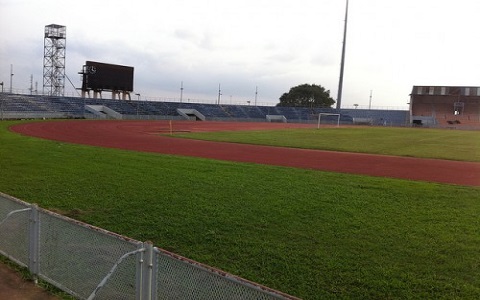

Sports is no doubt a unifying factor worldwide.
A vibrant sports industry is also a great avenue to generate revenue for all stakeholders.
Sports is an industry with unparalleled global reach and power. Globally, sports-related turnover amounts to three per cent of world total economic activity.
In Nigeria, sports is a national passion and it is the dream of most youths to exploit it as a stepping-stone to success. However, many sports loving Nigerians are still disturbed by the level of decay most stadia in the country being owned by governments.
The unpleasant pictures of stadia in Ibadan, Lagos, Abuja, Warri and Enugu show that these stadia have been neglected for many years due to lack of maintenance culture of their custodians.
Roofs of these stadia are torn, their seats, playing surfaces and athletics tracks damaged, and have become habitation for destitute. These stadia are without electricity, while some parts of the stadia have been converted to cool spots.
Obafemi Awolowo Stadium, formerly Liberty Stadium was opened in 1960 during the tenure of Chief Obafemi Awolowo, who was the Premier of the Western region at the time.
On August 10, 1963, the stadium hosted the first ever boxing world title fight in Africa, which was the middleweight championship of the world belt, fought between Nigeria’s own Dick Tiger and Gene Fullmer of the USA.
Also in 1980, the stadium hosted several matches during the African Cup of Nations, including a semi-final between Algeria and Egypt, and in 1999, the stadium was selected along with eight other stadia in Nigeria to host the 1999 FIFA World Youth Championship.
The National Stadium, Lagos, which opened in 1972 ahead of the second All Africa Games in 1973, now a shadow of itself, was the venue when the Green Eagles won the Nations Cup for the first time in 1980.
For years, the neglect of these stadia has denied the national football teams the benefit of having a home to play international matches. The Three Lions of England play at Wembley, Les Bleus of France play at Parc De Princes, Paris and the Samba Boys of Brazil at the Maracanã Stadium, Rio de Janeiro.
In football, a settled home with the fans is regarded as an advantage for the host team.
Also, the dilapidated state of these stadia has caused youth restiveness as there are no free play ground and this has also contributed to the nation’s unemployment rate.
In many parts of the world, sports facilities are maintained diligently, which helps to raise new athletes and income.
The federal Ministry of Sports and Youth Development needs to make a difference. There should be partnership with corporate organizations and philanthropists, who are fully ready to give the nation’s stadia a turn around.
Lower investments in sports decrease the potentials for athletes to build their talents in Nigeria, and if urgent steps are not taken to give the nation’s stadia a facelift, the country will continue to experience brain drain in the sports sector.
Olaolu Fawole